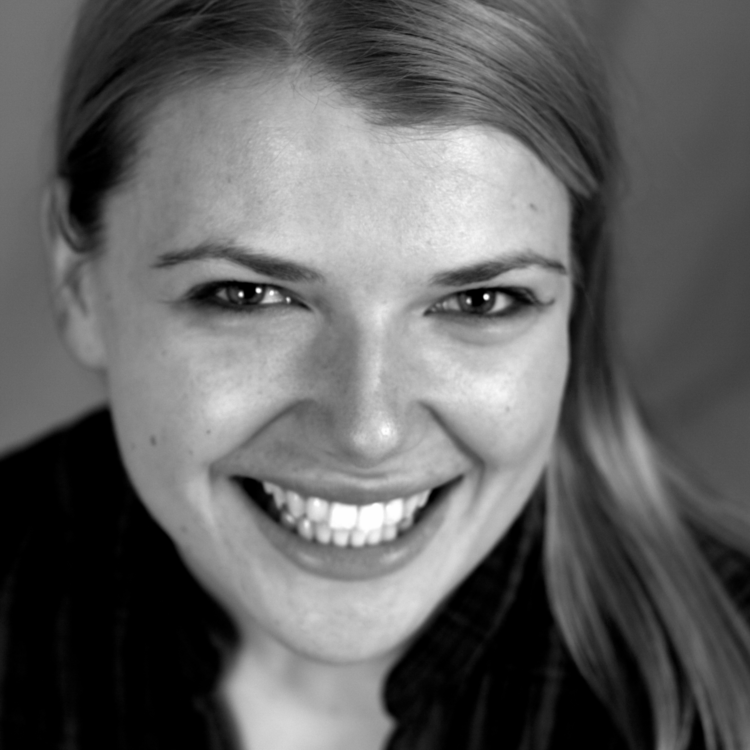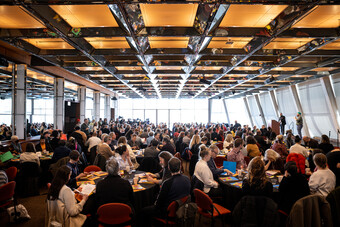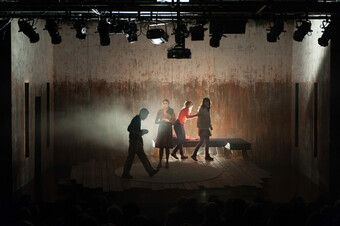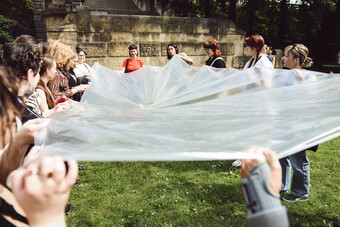International cultural exchange is impossible…
This four-part series documents the experiences of a young, Fulbright fellow, avidly exploring theater and life in Bucharest, Romania.
"International cultural exchange is impossible...therefore we must try," is a tenet of SITI Company, one of the first places where I came in direct contact with a community of international artists.
Sitting at the other end of my nine months in Romania, I contemplate this statement with profound confusion. I want to believe that I’ve “figured” Romanian theater out, but I also know that honestly that’s nowhere near true. I am still trying to understand Romanian art or rituals, but I think that taking the risk, trying out another culture, learning from the individual is the key. Creating the connection is the biggest need in a time when nations borders are getting taller. Connection and community between people of different backgrounds is what I always hope for in my shows. I believe that it’s our call as theater artists to cross the borders of communities, be it a country across a vast ocean or a different neighborhood; we attempt to connect different people to the same story.
So, how can these connections be fostered? How can I serve these two countries and communities, who, while very different, are also very similar in their struggle for audience, relevance and funding?
One of my main projects of this year turned into a playwriting experiment. I commissioned four Romanian playwrights (Bogdan Georgescu, Eugen Jebeleanu, Maria Manolescu and Mihaela Michailov) and four American playwrights (Cory Hinkle, Andrew Kramer, Caroline V. McGraw and Alice Pencavel) to write ten-minute plays around the same prompt, “My new jeans from H&M.” Commissioning playwrights is close to unheard of in Romania, writers’ groups are few and far between and writing around a prompt was generally regarded with trepidation.
These playwrights all wrote first drafts on their own, then were put in touch with each other and a Romanian director for the second draft. Some teams really connected, skyping with notes for each other, others had issues dealing with the time and language differences (similar problems that I experience even when working with collaborators of my nationality and in the same city). All of the plays were performed in a Romanian reading in Bucharest in May 2014, and they will all be performed in English in New York in the fall of 2014. (Videos of the Romanian readings are available here.)
What happens when you put playwrights in conversation through their plays? Can a cross-borders writing group exist on a virtual platform? What if the act of writing moves from an individual one into a process that looks more like devising? This experiment feels like the beginning of a larger project, exploring commissioning and writing across borders. I’m biased towards Romania and the US right now, but somehow these two countries feel like a perfect match. Romania is a melting pot of old customs and rituals, and added to it is the strong pull of America pop culture. The post revolution generation struggles to find their identity between these two extremes and the H&M plays reflect this dichotomy.
I sat in the first rehearsal of one of these shows and naively asked the Romanian actors, “When have you felt like you were the underdog?” Each actor answered in the exact same way, “ We fight against the system every day. I feel the pressure, the inability to do anything and I fight it in any small way that I can.” The “Man” in Romania looms large, the lack of funding, opportunities and jobs sends the young generation abroad, where they are looked on with disdain as the immigrants who come to steal jobs from the residents. But the artists who remain prevail, making work in a country and a culture that sometimes seems to set roadblocks at every corner. The art triumphs, in bars, apartments, theaters built in garages, basements and museum staircases. This comes from a need to fight the system in any way they can, a need to make work, to write, direct and act, and the hope of being picked up, promoted or supported a distant goal.
So what has this drive to make work in Romania taught me?
I learned that art that has nothing to lose makes for theater that is fierce and always has something to say. While the larger state institutions are funded and “guided” by the government, the younger artists use the independent theater scene to use their voice against this system. A new way of making theater seems to be growing here, one that is built from the bottom up, that strives for open economics, distrusts the state and works to make community among these other young companies. They are building the system they want to work in, against all obstacles.
The American standard of play development feels like a dream, in comparison to the scraps that emerging Romanian writers get, but the general comparison is that while American playwrights know the rules of structure, form and storytelling, they write safe plays. The Romanian writers, who are mainly self-taught, on the other hand, tend to be more daring. Chances are they won’t be produced anyway, so they might as well write exactly what they want to say. These writers stand out in their risk taking, in a culture that promotes fitting in with the crowd and keeping your head down to survive.
The young Romanian artists are trying to create a new structure of theater in any way they can and, I believe, that we, as young American artists and administrators, can learn from our fellow artists in Romania. We must try international cultural exchange, we must share ideas across borders and we must band together for the future of global theater. Who knows if it would lead to genuine cultural exchange, but the act of taking a risk is the biggest step.









Comments
The article is just the start of the conversation—we want to know what you think about this subject, too! HowlRound is a space for knowledge-sharing, and we welcome spirited, thoughtful, and on-topic dialogue. Find our full comments policy here
Thank you so much Hannah! I am currently working on my Master's in the Art of Teaching in English and plan to use Drama and Arts Infused Education in the class. We are doing a project based unit in global competence and are exploring real world applications. In other words we are being asked to come up with ways to have our students do much as you are and facilitate cross cultural communication and/or collaboration. Also, I am in New Jersey right now so I would love to come to NY in May to see the production(s).
Thank you for writing this Hannah. I am currently working on my application to do a Fulbright in Romania next year in music. It was helpful for me to read a bit about your experiences and observations. All best,